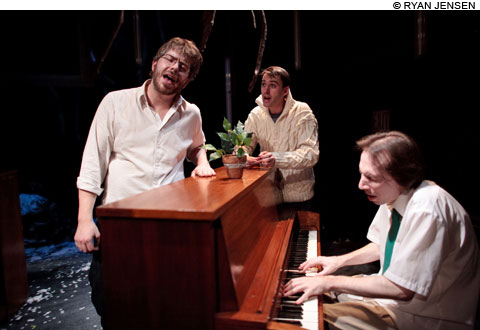
VIVA FRANZ! The “bad” singing and clunky piano technique in this “Schubertiade” express emotions that concert-ready performances often don’t get near. |
Three guys. Not singers, but they sing. Not pianists, but they play the piano. Three pianos. Actors whose love of music doesn't seem like acting. They're in Three Pianos, a theater piece — hard to call it a play — that's just begun a run at the A.R.T. (through January 8). In New York, it won an Obie. Here, it won my heart.The premise is simple. The guys — Rick Burkhardt, Alec Duffy, and Dave Malloy (the writers, arrangers, and performers of Three Pianos) — have dropped in for a party that turns into a "Schubertiade," like when Franz Schubert's poet-, musician-, and artist-friends got together, drank, and talked about, listened to, or played Schubert's latest works. The central work here is Schubert's great tragic song-cycle, Winterreise ("Winter Journey"), his setting of 24 poems by Wilhelm Müller about a "wanderer" whose fiancée throws him over for a rich man. Distraught, he sets out into an icy landscape that's a projection of his own dark thoughts, with a sadness approaching madness.
"David" (Malloy) — like Schubert's wanderer — is depressed because his girlfriend has left him. And in the phantasmagoria of Three Pianos, the contemporary party turns into an imagined Schubertiade. "Alec" begins with a lecture. With orotund British diction he intones: "Once upon a time, there was a song cycle." But as he gets more excited about Schubert, his phony accent disappears. "Rick" actually becomes Schubert himself. But the time zones are broken from the get-go. The apartment where the party takes place (designed by Andreea Mincic), with its pianos, potted plants, and drawers filled with contemporary stuff — laptop, Grey Poupon mustard, slices of cheese, booze — is also filled with birch trees, a toy town, a graveyard. Snow falls inside as well as out.
We get gossip about Schubert, who is dying of syphilis, and his circle of gay (in all senses) and depressed, wealthy and indigent bohemians. There are debates about the difference between opera and song (opera is about conflict on the world stage, songs are "on the stage which is the interior of the lover's head"), and whether songs — Winterreise or the Beatles' "Yesterday" — require trained voices to be "transcendent." (No!) Some lighthearted but serious discussion concerns how Schubert transforms a poem about not wanting to sleep into an ironic lullaby, or reverses expectations by using "happy" major keys for some of the saddest songs (Schubert bridles when he's accused of using this ploy too often). Not everyone likes all the songs equally.
A lot of the fun is in how director/collaborator Rachel Chavkin has the guys render the Schubert songs themselves. One song is delivered as a barbershop quartet (or, at least, a trio), in close harmony. Another as stride jazz with a saxophone added to the pianos. Another emerges, quite touchingly, as a rock ballad. The ironic "Mut" ("Courage") becomes a nightmare drinking song. When one of the guys is surrounded — trapped — by all three pianos, he plays the accompaniment swerving from one piano to the next. Schubert's body gets laid out on the facing keyboards of two pianos pushed together.